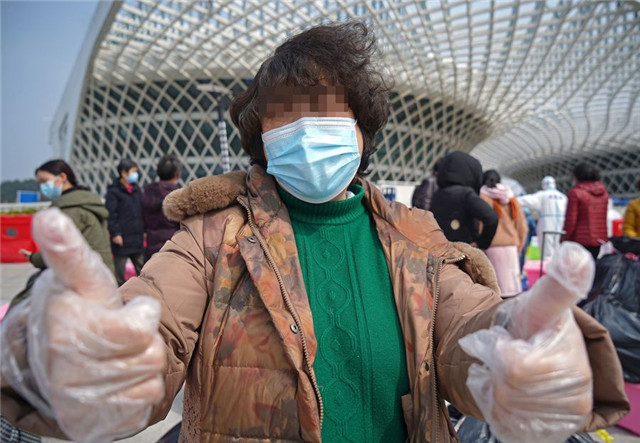
Chinese renowned respiratory scientist Zhong Nanshan receives an interview with Xinhua in Guangzhou, south China's Guangdong Province, Jan. 28, 2020. (Xinhua/Liu Dawei)
China's experience can help the world avoid detours in their fight against the COVID-19 outbreak, Zhong Nanshan said.
Renowned Chinese respiratory specialist Zhong Nanshan said Thursday that if most countries act like China, attaching national-level importance to response efforts, the global COVID-19 pandemic could be brought under control "by June."
Zhong made the remarks at a press conference in Guangzhou on Thursday.
"I know that some countries have done a good job and some countries have not. Some countries have reminded people to be wary of the virus and not to treat it as flu. Our estimate of global control by June was based on the positive measures taken by those countries, but if the world fails to attach great importance to addressing the threat and infectiousness of the virus through interventions, this timeframe may be extended," Zhong said.
The World Health Organization (WHO) on Wednesday characterized the COVID-19 outbreak as a "pandemic" as the virus continues to spread worldwide while urging the international community to take urgent and aggressive action to contain the pandemic.
Zhong said the WHO has declared the coronavirus outbreak as a pandemic, which demands more measures to be taken by relevant countries. Zhong called on all countries to respond to the initiative of the WHO and take interventions at the national level.
Currently, the fatality rate in Italy is about 6 percent, and that in France and Spain is about 2 percent to 3 percent, whereas the average fatality rate in China is reported as 3 percent. The fatality rate in Wuhan and Hubei, the epicenter of the outbreak, is above 4 percent, but the rate in other provinces outside Hubei is very low, as very effective prevention and control measures have been taken, according to Zhong.
China's experience can help the world avoid detours in their fight against the COVID-19 outbreak and the mortality rate of the current COVID-19 outbreak overseas is similar to the early stages in Wuhan, Zhong added.

A cured patient thumbs up as she leaves the Jiangxia temporary hospital in Wuhan, central China's Hubei Province, March 10, 2020. (Xinhua/Cai Yang)
Zhong said his team has exchanged ideas on the epidemic prevention and control with the Hong Kong Special Administrative Region, Japan, Singapore, and a number of European countries, and Chinese experts have been sent to Italy to facilitate further communication.
It is essential to enhance the exchanges between China and overseas regions since China's experience and lessons over the past two months can help the world reduce both the prevalence and mortality rates, Zhong said.
China on Thursday said the peak of the COVID-19 outbreak in the country is over, hours after the WHO declared the epidemic outbreak as a pandemic.
New cases keep declining and the overall epidemic situation remains at a low level in China. The number of new confirmed cases in Wuhan has dropped to single digits, with only eight cases reported on Wednesday. No new cases had been reported in other cities of Hubei for a week in a row, according to the National Health Commission.
However, there are now more than 118,000 confirmed cases in 114 countries and regions, and 4,291 people have lost their lives. The number of coronavirus cases, deaths and affected countries is expected to climb even higher in the days and weeks ahead, according to the WHO.
China has basically contained the coronavirus spread as a number of provincial-level regions have reported no new cases for days, but the new risks largely come from imported cases, said Zhong.
By the end of Wednesday, 85 imported cases had been reported, according to the National Health Commission.
Minimizing the risks of imported COVID-19 cases has become a priority in China's epidemic control and prevention efforts, Zhong added.
Imported cases often arrived in China with some symptoms, but not necessarily a fever, so more efforts should be made on monitoring the cases, said Zhong, suggesting that nucleic acid tests should be used for emergency cases.




